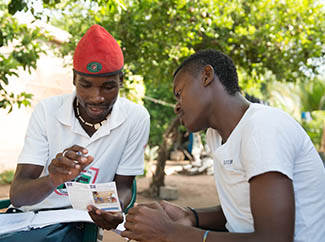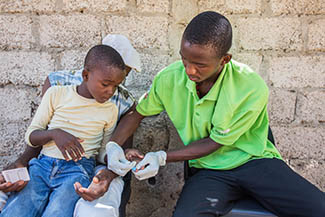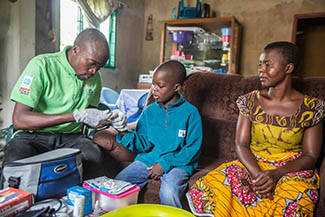consent_cookie
Duración: 1 year
Stores the user's cookie consent state
28-11-2022
Inequalities which perpetuate the AIDS pandemic are many and act as barriers to fighting AIDS the epidemic; we can tackle them. World AIDS Day, 1 December, theme: “Equalize” is drawing attention to addressing the HIV and AIDS challenges stumbling progress.
In Humana People to People, we have been and continue addressing the inequalities holding back progress to end AIDS by 2030. We have been part of fighting HIV and AIDS since 2000 and our efforts over the past two decades impacted 22 million people.
The world has only eight years left before the 2030 goal of ending AIDS as a global health threat. Economic, social, cultural and legal inequalities must be addressed as a matter of urgency. In a pandemic, inequalities exacerbate the dangers for everyone. The end of AIDS can only be achieved if efforts tackle the inequalities which drive it.
“We can end AIDS – if we end the inequalities which perpetuate it. This World AIDS Day we need everyone to get involved in sharing the message that we will all benefit when we tackle inequalities,” says UNAIDS Executive Director Winnie Byanyima. “To keep everyone safe, to protect everyone’s health, we need to Equalize.”
According to UNAIDS, globally 38.4 million people were living with HIV, 1.5 million acquired new HIV infection and 650 000 people lost life from AIDS-related illnesses in 2021. Every week, around 4 900 young women aged 15–24 years become infected with HIV. In 19 high-burden countries in Africa, dedicated combination prevention programmes for adolescent girls and young women are operating in only 40% of the high HIV incidence locations.
Data from UNAIDS on the global HIV response reveals that during the last two years of COVID-19 and other global crises, progress against the HIV pandemic has faltered, resources have shrunk, and millions of lives are at risk as a result. Four decades into the HIV response, inequalities still persist for the most basic services like testing, treatment, and condoms, and even more so for new technologies.
Our health projects focus on the biggest health challenges, among them to get Total control of the HIV and AIDS epidemic. Our HIV and AIDS programme Total Control of the Epidemic (TCE) is based on person-to-person mobilization of people for HIV testing, referral for treatment and support for those on treatment so that they never miss it.
In alignment with the UNAIDS 95-95-95 targets to end AIDS by 2030, our members help people to know and understand their HIV status. People who test HIV positive receive the sustained treatment they need, with the ultimate aim of suppressing the virus.
In the past year, TCE, operated by our member DAPP Zambia, mobilized and reached 334 342 people with HIV prevention messages and other HIV interventions. From the total people reached 76 796 were tested for HIV, 21 247 were diagnosed HIV+, and 98% of the people diagnosed with HIV were supported to start HIV treatment.
People living with HIV are more likely than others to become sick with TB. Worldwide, TB is one of the leading causes of death among people living with HIV. Without treatment, as with other opportunistic infections, HIV and TB can work together to shorten lifespan. Our TCE programme has been so successful that the method behind it is being used to detect cases of TB, and to support people infected with the disease to get treatment and complete it until they have been cured.
For the past 15 years, our member ADPP Mozambique has been implementing community-based TB projects in cooperation with the Ministry of Health impacting 1 million people every year. A major focus of TB response is on TB prevention, active TB case finding, contact tracing, adherence to medication and treatment completion.
World AIDS Day remains as relevant today as it’s always been, reminding people and governments that HIV has not gone away. All of us, everywhere, must do all we can to help tackle AIDS inequalities.


